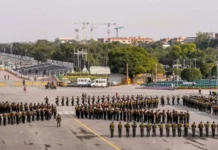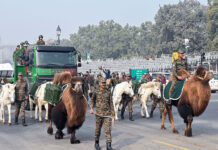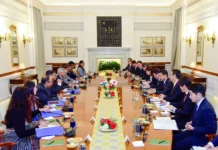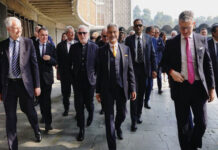 NEW DELHI: Gujarat Chief Minister Narendra Modi today launched a fresh attack on the Centre, saying the country was in the grip of pessimism because of “policy paralysis, intellectual bankruptcy and lack of leadership”.
NEW DELHI: Gujarat Chief Minister Narendra Modi today launched a fresh attack on the Centre, saying the country was in the grip of pessimism because of “policy paralysis, intellectual bankruptcy and lack of leadership”.
He said the Center’s policies “lack urgency or seriousness” in tackling economic crises and thus the “sense of pessimism” in the 12th Plan.
“There is a policy paralysis, intellectual bankruptcy and lack of leadership in the country because of which the country was experiencing stagnancy. We are going on the path of negative growth,” Modi told reporters at the 57th National Development Council (NDC) meeting here.
He said when the entire world was looking at India in the context of development, there is sense of pessimism from the ones who are leading the nation making it difficult to move forward.
In his speech at the meeting, Modi said, “It seems that there is no urgency or seriousness in tackling economic crises facing the country. There has been a virtual lack of direction in the macro-economic management of the country.”
Attacking the government for lowering the growth target for the 12th Plan, Modi said though the target of 9 per cent GDP growth, talked about last year, appeared ambitious, “it was not impossible to achieve if we had the political will to do what is necessary”.
“In this context, it is painful to note the unmistakable sense of pessimism in the 12th Plan document…Significantly lowering the growth targets of the 12th Plan will further add to the mood of despondency and pessimism in the country and cast increasing doubts on the sustainability of the India Growth Story,” he said.
Modi sought to project the Gujarat model of development by listing out the initiatives taken by him in various sectors including agriculture, urban development and decentralized planning.
Modi, however, evaded questions on whether he was ready to lead the nation. Questioning the Centre for blaming the international economic situation for the slow growth, Modi said how then were some of the states performing better.
“If the Centre can blame the international situation, who should the states point out to,” he said, referring to the high growth rate in some states including Gujarat.
Modi also called for setting up a National Resources Commission on the lines of the Finance Commission which discusses the allocation of grants to states every five years.
The Chief Minister said the National Resources Commission should decide on the quota utility of natural resources which were a part of the state, but noted such states should be given a say while making such allocations.
He said the country is facing a demographic opportunity as 65 per cent of the population is young and pitched for a youth-centric growth which focuses on skill development.
Modi said the Planning Commission had also studied the Gujarat model for skill development and recommended it to other states.
Contending that growth in manufacturing has been stagnating at 16 per cent, Modi said, “The outlook for employment for the youth in industry remains bleak which casts a doubt on India’s capacity to take advantage of the demographic dividend.
“It is unfortunate that the central government has been bereft of any vision or strategy in this regard. This feeling of helplessness in making effective policy interventions has resulted in job creation suffering and the youth of the country becoming disillusioned,” he said in his speech.
Modi, who was sworn-in as the Chief Minister for the fourth time yesterday, was greeted by several leaders including Tamil Nadu Chief Minister J Jayalalithaa, Maharashtra Chief Minister Prithviraj Chavan, Punjab Chief Minister Parkash Singh Badal and Uttar Pradesh Chief Minister Akhilesh Yadav. Modi walked up to Himachal Chief Minister Virbhadra Singh to greet him.
Modi also attacked the Centre for taking “unilateral” decisions and said it should “resist the temptation to tinker with the federal structure mandated by the Constitution.”
“There has also been a tendency to take unilateral decisions by legislating on subjects which are dealt by states where huge financial liabilities are created for the states without commensurate transfer of resources from the Centre.
The Right to Education Act is a recent example of this,” he said.
He wanted the Centre to set up a structured mechanism to address such issues and resolve them in a time-bound manner.
On the issue of capping of subsidies on cooking gas, Modi said the Centre had shown “little concern” for the “constant agony” that millions of Indians are forced to undergo on a daily basis because of rising prices.
“The recent decision of the central government to restrict the number of LPG cylinders to six per year will further add to the misery of India’s middle classes and the poor,” he said and demanded a review.
Modi suggested piped natural gas as an alternative to LPG cylinders and wanted the government to come out with a time- bound detailed policy and incentivise states who take up this project on a priority basis.
“The sustainable, long-term solution is to establish a gas-grid supplying piped gas to households for domestic use.
This would result in proper targeting of subsidies and eliminate wastage,” he said. -PTI






